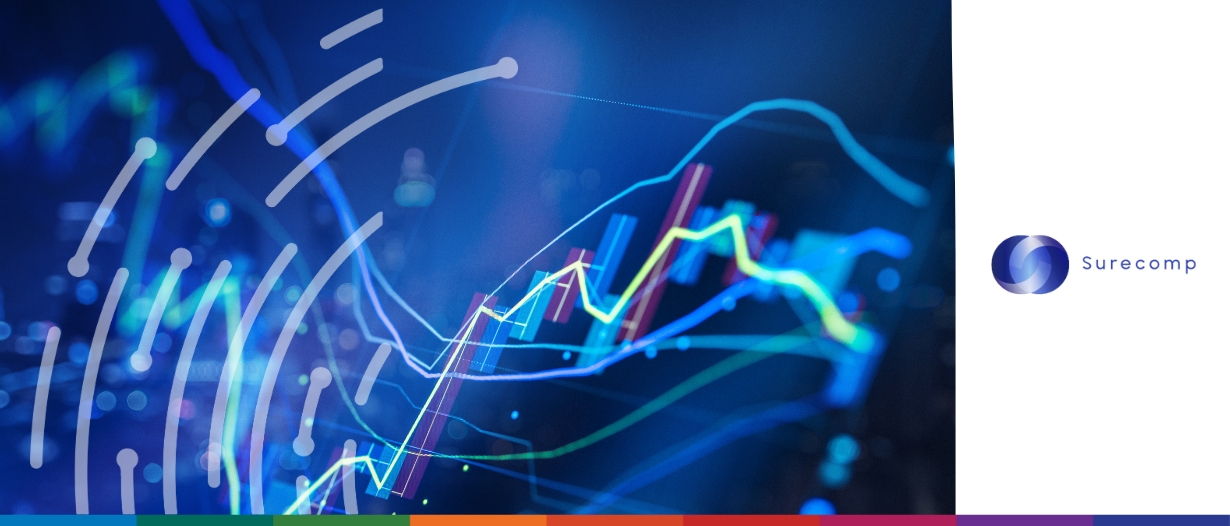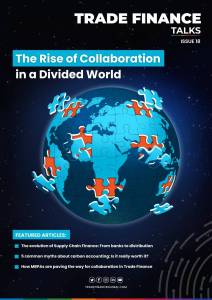Estimated reading time: 9 minutes
With the passing of the UK’s Electronic Trade Documents Act (ETDA), the digital trade world is changing. While this is welcomed news for the entire industry, it also means that new partnerships and innovations need to come to fruition.
The legal framework is now a reality, the burden is now on the industry to take advantage of the moment.
That is precisely what Surecomp and Wave BL are doing with their collaboration. To learn more about this collaboration, and their efforts to further digital trade, Trade Finance Global’s Brian Canup (BC) sat down with Enno-Burghard Weitzel (EBW), Senior Vice-President of Strategy, Digitization and Business Development, Surecomp and Ofer Ein Bar (OEB), VP Business Development, Wave BL.
BC: Let’s jump right into things. Can you give an overview of the Surecomp and WaveBL collaboration?
EBW: We both share the vision of the need for collaboration to effectively bring digitisation benefits to the trade community. As our solutions complement each other nicely, our shared customers benefit from an enriched user experience.
While users on RIVO can manage the full Letter of Credit (LC) lifecycle, with the connection to WaveBL, they can enjoy greater value from the deep integration of their eBL into their LC flow. With a stronger value proposition, the solutions can jointly and individually provide better business cases to corporates and banks, enabling them to have faster ROI.
OEB: The WaveBL platform is used regularly for the issuance of electronic Bills of Lading, by several of the largest container ocean carriers, issuing thousands of electronic Bills of Lading every month. The majority of trade transactions are between an exporter and an importer and do not require banks to be involved in the trade documentation process.
As the adoption of electronic documents by banks is very slow to say the least, partnering with Surecomp, with its expertise in the trade finance world, was only a matter of time.
Surecomp is a leading trade finance expert with a clear advantage within the FI industries. The joint solution will allow banks and corporates to get access to the WaveBL Bills of Lading through the Surecomp Rivo platform. The Surecomp platform will integrate the WaveBL eBL into the trade finance LC flow, creating a fully streamlined end-to-end transaction for each party involved. Stay tuned, as the next stage will come soon!
BC: The big news of the year is the passage of the ETDA in the UK. How does this landmark legislation fit in with Surecomp and WaveBL’s partnership?
EBW: It’s at the core of our partnership. We both want to foster the adoption of digital documents. All the while national law is still enforcing paper, both of our teams have to spend a lot of time convincing parties that going digital with dedicated solutions is an alternative.
Now, everyone can rely on national law in more and more jurisdictions, namely the UK and Singapore. So any BL issued referencing Singapore or UK law, now can be issued as eBL, which sets the legal basis.
WaveBL brings the technical expertise for reliable and scalable digital issuance, and the RIVO platform enables parties to manage the whole trade finance transaction with all counterparties. It seems like we’ve all just waited for the UK to be the digital booster.
OEB: The ETDA gives electronic bills of lading and related trade documents the same legal status as their paper counterparts. The landmark legislation modernises and overhauls outdated laws surrounding the use of electronic trade documents in international trading.
ETDA makes cross-border and international trade more efficient, cost-effective, and environmentally sustainable. ETDA is part of the global effort to harmonise and digitise global trade. Besides ETDA removing a huge barrier to trade digitalisation, it acts as a vote of confidence by the highest authority regarding the path we are on.
BC: What are the opportunities for trade digitalisation in the UK (and beyond), and how can businesses, both large and small, take advantage of them?
EBW: We fully embrace the work of the UK team of experts, from the legislation, the ICC and the industry. Now enabling any trade contract and title document to be fully digital, is truly pivotal since a major share of all the trade contracts out there are based on the UK law already today.
So no more rule books are needed to accept digital documents in a small club with high barriers to join. Now everyone has the option to adopt rapidly across the industry, and across countries. This will put some healthy competitive pressure on other countries to follow quickly. On RIVO, parties will be able to issue and manage any document as digital original, significantly reducing the barriers to trade and making trade finance available to everyone.
OEB: The UK is considered a major hub for global trade, leading the legislation worldwide. This has been the case with COGSA 1992, and now with the ETDA 2023, taking MLETR a further step.
According to the UK Department for Science, Innovation and Technology, the UK economy is set to see over £1 billion boost over the next decade, with UK businesses enjoying huge cost savings.
The UK ETDA also acts as the cornerstone for digitalising trade across the world. Global trade is facing new regulatory requirements and industry standards. Environmental, social, and governance (ESG) compliance issues are also playing a role. In these uncertain economic times, supply chain disruptions and changing customer demands are also leaving their mark.
However, the adoption of electronic trade documents acts, such as the Electronic Trade Documents Act (ETDA), is expected to reduce friction and financing gaps, making it easier and cheaper for companies to engage in cross-border transactions. It is now the time to realise these spoken benefits.
BC: What are some of the challenges that come with digitalising trade documents, and what is Surecomp doing to address these issues?
EBW: It seems that the key prerequisites for going digital are the legal foundation, the technical basis and the willingness of the parties to change. We’ve touched upon Singapore and the UK, the other G7 countries pledged to implement MLETR in their national laws by 2025. Surecomp are actively involved in the working groups in Germany and France.
So let’s consider this done.
Going digital requires a technical platform, that is open, scalable and fit for purpose, i.e. trade finance specific. Openness is key because the trade community is so diverse, two trade transactions will almost never include identical parties. And with so many parties and specialist technical solutions around, the more open a solution, the greater the value it can provide to the community.
Our successful partnership and technical syncing with WaveBL serve as an excellent demonstration of our strategy in action. Additionally, there are various other solutions for issuing electronic Bills of Lading (eBLs), and we plan to integrate with those that are open to collaboration in the next phase.
This will create a generic ‘eBL value proposition’, providing a service without forcing the parties to limit their ability to conduct their own business. Lastly, we’re engaging with the experts and practitioners in the industry to showcase the level of maturity and functional coverage. Sharing success stories is a necessity to support the change journey.
BC: Do you have a case study for the successful implementation and use of Surecomp’s RIVO platform?
EBW: Being a digital collaboration platform, RIVO serves corporates, financial institutions and fintechs alike. Hence, any case study can only represent a small fraction of RIVO’s value proposition.
But, let’s look at one corporate, with a centralised treasury function at the headquarters. Operating globally, they engage hundreds of trade finance experts spread across 50+ countries to support their sales teams in their product delivery.
Their key criteria for choosing RIVO as their trade finance management solution were UX and reporting. With so many colleagues dealing with their guarantees, stand-bys and commercial LCs, they needed a solution that is easy to onboard, intuitive in use and provides strong, yet flexible workflows.
Being a publicly listed company, they used to handle their quarterly financial reporting to their Group Finance manually. Now, they can automate this process using our built-in Business Intelligence (BI) reporting tools. These features alone made RIVO an attractive choice for them. Furthermore, as a Software-as-a-Service (SaaS) solution, RIVO keeps getting better each quarter with new features. For instance, we recently collaborated with ICC Germany on a proof of concept for electronic Bills of Lading (eBLs), adding even more value for the company.
We provided evidence that all trade parties, exporters, importers, as well as the banks, can fully manage a WaveBL bill of lading through RIVO. In the next phase we’ll extend this to further eBL issuers, invite shipping companies and further participants.
So, without having to lift a finger, the company we featured in our case study can now take advantage of electronic Bills of Lading (eBL) features and easily transition to digital workflows for their Letters of Credit (LC). This experience also offers valuable insights from a fintech perspective, making it a compelling case study in that regard as well.
BC: Trade digitalisation is gaining more mainstream acceptance now, with the UK codifying it, and numerous other jurisdictions working on similar laws. What are the next steps that will make tangible progress within the international trade industry?
EBW: Pivotal players actually pulling it into their day-to-day business. If digitisation is bringing an economic benefit, each party should share these benefits with its counterparts actually going digital. E.g. a shipping company charging higher fees for non-eBLs, a bank waiving the courier charges under eUCP LCs, and corporates giving better payment terms if all documents are sent digitally. The quicker people experience tangible benefits, the faster they’ll adopt the new technology.
OEB: To drive faster digitalisation and adoption of electronic documents in global trade, strong alliances are needed between leading companies in global trade are needed. The partnership of Surecomp and WaveBL is a prime example of how powerful and successful such an alliance can be, revolutionising the global trade industry for the greater good.
Digital transformation of international trade reduces the costs of engaging in international trade, connecting more businesses and consumers globally. This requires policymakers to address the unstoppable digitisation of trade documentation. End-to-end trade digitalisation requires global access to reliable, affordable, and fast connections to close the digital divide as well as a legal framework enabling secure data transmission across borders.
Data and process standards for the submission of shipping instructions and issuance of the bill of lading have already been established through DCSA and accepted by many container carriers, with more to follow. What is crucial to move ahead is the worldwide, across the board, adoption of eBLs and related trade documents using platforms such as RIVO and WaveBL.
 Australia
Australia Hong Kong
Hong Kong Japan
Japan Singapore
Singapore United Arab Emirates
United Arab Emirates United States
United States France
France Germany
Germany Ireland
Ireland Netherlands
Netherlands United Kingdom
United Kingdom





























Comments are closed.